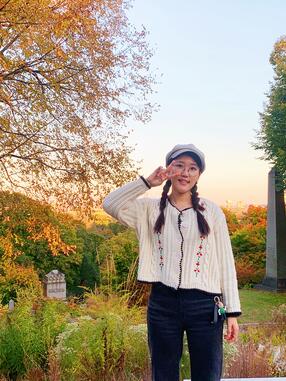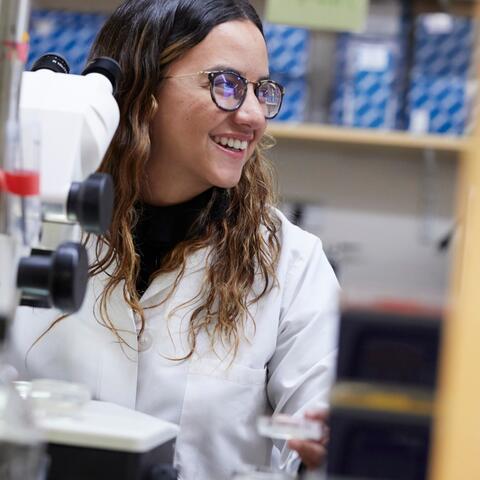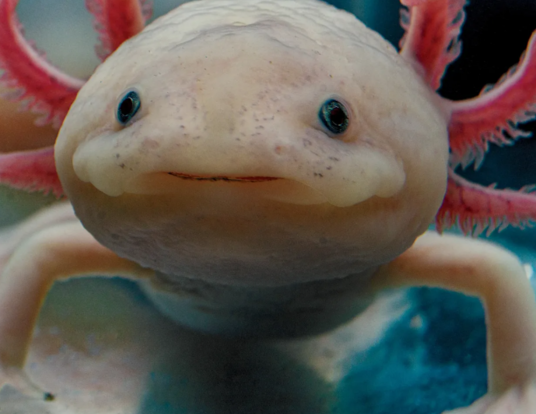Super Sensor
Elizabeth Park, PhD student

Research at Risk: Since World War II, universities have worked with the federal government to create an innovation ecosystem that has yielded life-changing progress. Now much of that work may be halted as funding is withdrawn. Find out more about the threats to medical, engineering, and scientific research, as well as how Harvard is fighting to preserve this work—and the University's core values.
Elizabeth Park is a PhD physics student at the Harvard Kenneth C. Griffin Graduate School of Arts and Sciences. She discusses her research with atomic sensors that image nanoscale electric and magnetic properties, her personal journey to PhD study, and outreach activities at Harvard.
Measuring Magnetic Fields

Like many physics PhD students, I was interested in science from a very early age, mostly astrophysics, because it was more accessible to the general public through books and documentaries. But then I worked in condensed matter physics research during college. I loved finding the missing puzzle pieces, and when things do work, there’s a lot of catharsis. I reached out to different physics professors during the graduate school open houses and finally joined Professor Amir Yacoby’s group at Harvard.
Currently, I am working on an atomic sensor to detect underlying physical qualities inside of materials, like magnetization. When electrons move, they produce currents that produce magnetic fields. With this knowledge, I can also use the sensor to detect electrical properties inside materials. The atomic-size sensor can produce high-resolution scans, which are critical because the more precisely you can image a system or material, the better you can understand it.
We use the sensor to image superconductors and topological systems. Superconductors are materials that conduct energy with zero energy losses or resistance at low temperatures; traditional conductors always have some amount of energy loss. When you run a current of energy through a topological system, it has a unique flow because of the system’s configuration. In the past, we had to use conventional measurements, which often made it hard to directly detect qualities of these systems. With our sensor, we can take direct images and scans and understand them better.
Currently, our research is focused on the fundamental properties of materials. We are laying the groundwork for future applications. What we discover through our research can support technologies like magnetic memories or even quantum information that uses superconducting materials. There has been a lot of interest in this technology from startup companies as well.
No Fear
Other than my own interest, my father was one of the people who influenced my journey to a PhD. He is a history professor in East Asian studies. As I go on in my PhD journey, I think I’m feeling the things he must have felt when he was a junior researcher. It’s good to talk with him whenever I’m feeling stuck. He encourages me, saying, for instance, that failing is just part of research. Because we’re in different fields, there is obviously this gap, but that’s been filled in by professors at the department.
My advisor, Professor Yacoby, has a very creative and profound understanding of what we do. He does not fear failure. Whenever I tell him that an experiment didn’t work, I never get a discouraging response. He might be disappointed, but he’s not disappointed in me for trying, and he doesn’t want me to give up. He gently offers suggestions and encourages me as I head in that direction. Professor Kim also gives me helpful advice and encourages me whenever I go talk to him about my concerns and progress in my PhD program.
There’s a lot of failure in science, particularly at the PhD level. It’s easy to start questioning yourself and the direction you’re going in, so you need a lot of encouragement. All the nice support I get from the people throughout my PhD journey helps a lot.
Science Steppingstone
I’ve volunteered in a few outreach programs. One of them was QUERY, an MIT and Harvard initiative that connects physics graduate students to Texas public schools to introduce and teach quantum science. We work on projects, give lectures, and hold discussions to introduce high school students to quantum science.
The interactions with students and the public make you develop a new perspective. When you’re a junior scientist, you just want to learn more, you want to develop yourself and grow. But interacting with people and students teaches you that, as a scientist, you can change how the public thinks about science. You can introduce advanced scientific ideas to people who are interested but have no experience. Particularly with high school students, maybe our teaching could be the stepping stone to a whole career.
Get the Latest Updates
Join Our Newsletter
Subscribe to Colloquy Podcast
Simplecast




